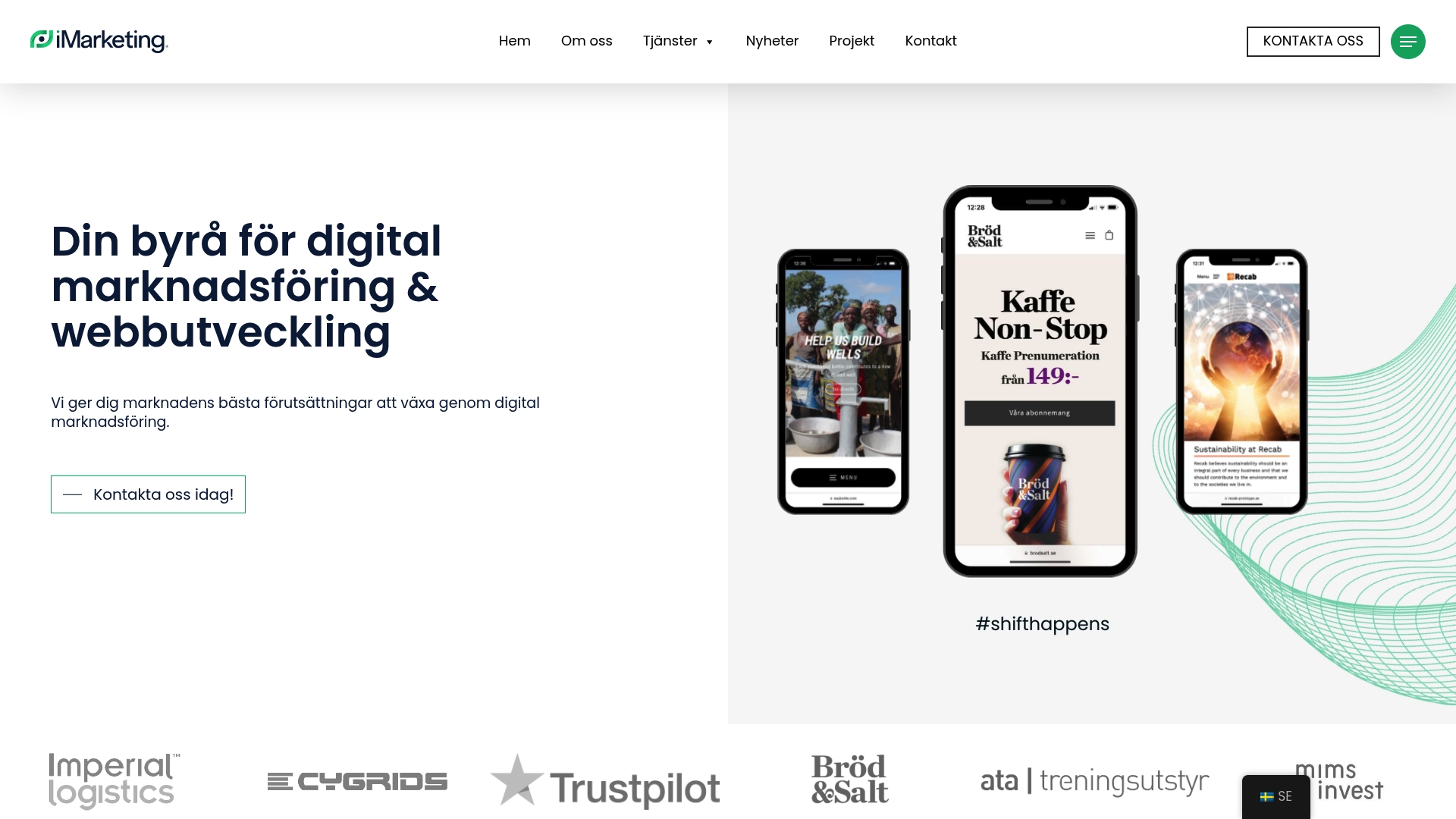Did you know that over 90 percent of Swedes with internet use digital channels to find information about products and services? Online marketing is rapidly changing how businesses are seen, building relationships and creating new business opportunities. To truly succeed, it's important to understand the basics and use the right tools to make every marketing dollar count.
Table of contents
- What is online marketing and its core concepts?
- The most important digital channels and their uses
- Measurable results and benefits for business growth
- Costs, investments and common challenges
- Comparison with traditional marketing and common mistakes
Key Points
| Point | Details |
|---|---|
| Core concepts of online marketing | Includes SEO, content marketing, social media, and paid advertising, which are crucial for creating visibility and engagement online. |
| Effective digital channels | Social media, search engines and email marketing are central to reaching the right target audience and building a strong digital presence. |
| Measurable results | Digital marketing enables cost-effective campaigns with real-time analytics, leading to more precise strategies and higher engagement. |
| Differences from traditional marketing | Digital marketing offers interactivity and measurability, making it easier to optimize efforts compared to traditional methods. |
What is online marketing and its core concepts?
Online marketing is the strategic process of marketing and selling products or services through digital channels. It involves creating visibility, engaging potential customers, and converting visitors into buyers using internet-based tools and platforms.
The core concepts of digital marketing include several important elements that shape how companies communicate and achieve their goals:
- Search engine optimization (SEO): The process of improving website visibility in search engines
- Content marketing: Creating valuable and relevant content to attract and retain customers
- Social media marketing: Using social platforms to build brand and spread messages
- Paid advertising: Targeted ads through Google Ads, Facebook Ads and other digital channels
For small and medium-sized enterprises, digital marketing guide essential to competing effectively in the digital world. It is no longer just about having a website, but about actively working on strategic digital presences that create value and reach the right audience. By understanding and implementing these core concepts, businesses can build a stronger online presence, increase their visibility, and ultimately generate more business.
The most important digital channels and their uses
For modern businesses, digital marketing channels are essential for success. Each channel has unique strengths and suits different communication needs, making it important to understand their specific uses and potential.
Here are the main digital channels:
-
Social Media: Perfect for branding, customer engagement and direct communication
- Facebook: Broad audience and detailed ad customization
- Instagram: Visual marketing and younger audiences
- LinkedIn: B2B communication and professional networking
-
Search engines: Crucial for organic visibility and traffic acquisition
- Google Ads: Paid keyword advertising
- SEO: Long-term strategy for natural search ranking
-
Email marketing: Direct communication with existing and potential customers
- Newsletter
- Automated campaigns
- Personally targeted offers
For small and medium-sized businesses, we offer digital advertising guide opportunities to optimize their marketing efforts. By understanding and combining these channels strategically, companies can build a robust digital presence that reaches the right audience at the right time.

Measurable results and benefits for business growth
Digital marketing is more than just visibility – it’s a powerful growth engine for modern businesses. By using data-driven strategies, companies can measure and optimize their marketing efforts with a level of precision previously unimaginable.
Key benefits include:
-
Cost-effectiveness: Digital channels offer lower marketing costs compared to traditional media
- More precise audience segmentation
- Lower cost per acquired customer
- Possibility of quick budget adjustment
-
Real-time analytics and measurability
- Instant insight into campaign performance
- Accurate conversion rates
- Detailed customer behavior analysis
-
Increased customer engagement
- Direct communication with customers
- Personalized marketing messages
- Possibility of quick feedback
For small and medium-sized businesses, guide to sales-driving digital tools concrete strategies to maximize digital marketing efforts. By systematically measuring and analyzing results, companies can continuously improve their strategies and ensure profitable growth.
Costs, investments and common challenges
Digital marketing requires strategic financial planning that balances initial investments with long-term returns. Small and medium-sized businesses must carefully consider their resources and prioritize investments that will yield maximum impact.
Main cost categories include:
-
Technical infrastructure investments
- Website design and development
- Marketing platforms
- Analyses and follow-up tools
-
Content production
- Professional text production
- Graphic design
- Video production
Common challenges to handle:
- According to research data, customer data management require significant investments in quality assurance and systematization
- Choosing the right social channels requires continuous analysis and adaptation
- Limited budgets that must be optimized for maximum return
Successful digital marketing is not just about spending money, but investing smartly and measuring results continuously. Through strategic resource allocation, companies can build effective digital marketing strategies that generate real business value.
Comparison with traditional marketing and common mistakes
Digital marketing is markedly different from traditional marketing through its precision, measurability and dynamic nature. Over the past decade, digital strategies have completely transformed how companies communicate and reach their customers.
Main differences include:
Here is a comparison of digital and traditional marketing:
| Aspect | Digital marketing | Traditional marketing |
|---|---|---|
| Communication | Interactive Two-way communication |
One-way communication |
| Target group adaptation | High precision Segmentation |
Wide spread |
| Measurability | Real-time data Detailed analysis |
Limited Difficult to measure |
| Cost | Flexible Cost-effective |
Often high and firm |
| Optimization | Current Dynamic |
Difficult and slow |
-
Communication methods
- Traditional: One-way communication (television, radio, print)
- Digital: Interactive, two-way communication
-
Target group adaptation
- Traditional: Wide, general spread
- Digital: Extremely specific and precise
Common errors as companies often do:
- Ignore data analysis and measurement
- Use the same content across all platforms
- Underestimating the importance of continuous optimization
For small and medium-sized businesses, we offer digital advertising guide insights on how to avoid these common pitfalls. The key lies in continuously learning, adapting and improving your digital marketing strategies to ensure maximum effectiveness and return.
Maximize your business growth with smart digital marketing
Understanding the importance of online marketing is just the first step. Many businesses struggle to reach the right audience and get measurable results while keeping costs under control. By using strategies like search engine optimization, social media, and targeted ads, you can reach your customers effectively and create real engagement.
We at iMarketing.se offers comprehensive solutions to help you achieve your digital goals. Whether you need help with website development, optimization or digital marketing, we tailor strategies that deliver results and strengthen your online presence.
Take the first step towards increased sales and better visibility with our guide to digital marketing.

Discover how you can transform your digital presence into real business value. Visit iMarketing.se today and book a free consultation to begin your journey towards stronger growth and more customers.
Frequently Asked Questions
What is digital marketing?
Digital marketing is the process of promoting and selling products or services through digital channels, which includes search engine optimization (SEO), content marketing, social media, and paid advertising.
What benefits does digital marketing offer for businesses?
Digital marketing offers cost-effectiveness, real-time analytics and measurability, and increased customer engagement, making it a powerful tool for business growth.
How do you measure the success of digital marketing?
The success of digital marketing is measured by tracking the performance of campaigns using analytics tools, such as monitoring conversion rates and customer behavior.
What are the most common mistakes companies make in digital marketing?
Common mistakes include ignoring data analysis, using the same content on all platforms, and underestimating the importance of ongoing optimization of one's strategies.


